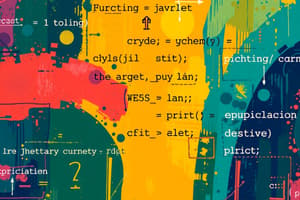Podcast
Questions and Answers
What is the main purpose of a function in JavaScript?
What is the main purpose of a function in JavaScript?
- To store data in an array
- To manage asynchronous operations
- To create object properties
- To perform a specific task (correct)
What is a closure in JavaScript?
What is a closure in JavaScript?
- A function that is called recursively
- A function with no parameters
- A function that retains access to its lexical scope (correct)
- A function executed immediately upon creation
Which of the following function types is not hoisted?
Which of the following function types is not hoisted?
- Function Expression
- Arrow Function
- Function Declaration
- Both B and C (correct)
How do you define default parameters in a function?
How do you define default parameters in a function?
Which of the following is an example of a higher-order function?
Which of the following is an example of a higher-order function?
What will a function return if no return statement is specified?
What will a function return if no return statement is specified?
In which scope are variables declared inside a function accessible?
In which scope are variables declared inside a function accessible?
What distinguishes an IIFE from regular functions?
What distinguishes an IIFE from regular functions?
Which statement about Arrow Functions is correct?
Which statement about Arrow Functions is correct?
What does the return keyword do in a function?
What does the return keyword do in a function?
Flashcards are hidden until you start studying
Study Notes
Overview of Functions in JavaScript
- Definition: Functions are reusable blocks of code that perform a specific task.
Types of Functions
-
Function Declarations
- Syntax:
function functionName(parameters) { // code to be executed } - Hoisted: Can be called before their definition in the code.
- Syntax:
-
Function Expressions
- Syntax:
const functionName = function(parameters) { // code to be executed }; - Not hoisted: Must be defined before calling.
- Syntax:
-
Arrow Functions
- Syntax:
const functionName = (parameters) => { // code to be executed }; - Shorter syntax and does not bind its own
this.
- Syntax:
Parameters and Arguments
- Parameters: Variables listed in the function’s definition.
- Arguments: Values passed to the function when it is called.
- Default parameters can be set using:
function functionName(param1 = defaultValue) { // code }
Return Statement
- Use the
returnkeyword to send a value back to the caller. - If no return is specified, the function returns
undefined.
Scope
- Functions create their own scope:
- Local Scope: Variables declared inside a function are not accessible outside.
- Global Scope: Variables declared outside any function are accessible throughout the program.
Higher-order Functions
- Functions that take other functions as arguments or return them.
- Commonly used in array methods like
map,filter, andreduce.
IIFE (Immediately Invoked Function Expression)
- A function that runs as soon as it is defined.
- Syntax:
(function() { // code to be executed })();
Closures
- A function that retains access to its lexical scope, even when the function is executed outside that scope.
- Useful for data encapsulation and private variables.
Callback Functions
- Functions passed as arguments to other functions, invoked after some operation is completed.
- Common in asynchronous programming.
Function Methods
- call(): Invokes a function with a specified
thisvalue and arguments. - apply(): Similar to
call(), but takes an array of arguments. - bind(): Returns a new function, permanently bound to a specific
thisvalue.
Recursion
- A function that calls itself either directly or indirectly.
- Must have a base case to avoid infinite loops.
Best Practices
- Use descriptive names for functions.
- Keep functions small and focused on a single task.
- Document functions with comments for better understanding.
Overview of Functions in JavaScript
- Functions are reusable blocks of code designed to perform specific tasks.
Types of Functions
- Function Declarations: Defined with the
functionkeyword and are hoisted, allowing them to be called before their definition. - Function Expressions: Assigned to variables and must be defined before being called; they are not hoisted.
- Arrow Functions: Introduced with a concise syntax; they do not bind their own
this, making them useful in certain contexts.
Parameters and Arguments
- Parameters: Variables defined in a function's declaration.
- Arguments: Actual values passed to a function when it is called.
- Default parameters can be established to provide fallback values.
Return Statement
- The
returnkeyword is used to send a value back to the caller; absence of return results inundefined.
Scope
- Functions generate unique scopes:
- Local Scope: Variables defined inside a function are not accessible outside.
- Global Scope: Variables defined outside functions are accessible throughout the program.
Higher-order Functions
- Functions that accept other functions as arguments or return them.
- Commonly utilized in array methods such as
map,filter, andreduce.
IIFE (Immediately Invoked Function Expression)
- A function that executes immediately upon definition.
- Noted for its syntax, which includes wrapping the function expression in parentheses followed by parentheses.
Closures
- Functions that maintain access to their lexical scope, even when executed outside of that scope.
- Effective for data encapsulation and managing private variables.
Callback Functions
- Functions provided as arguments to other functions, executed after the completion of an operation.
- Frequently used in asynchronous programming to handle events after completion.
Function Methods
- call(): Calls a function with a specified
thisvalue and individual arguments. - apply(): Similar to
call(), but takes arguments as an array. - bind(): Creates a new function that is permanently bound to a specified
thisvalue.
Recursion
- A technique where a function calls itself either directly or indirectly.
- Requires a base case to prevent infinite looping.
Best Practices
- Opt for descriptive function names for clarity.
- Keep functions concise and focused on a single responsibility.
- Document functions with comments to enhance understanding.
Studying That Suits You
Use AI to generate personalized quizzes and flashcards to suit your learning preferences.




